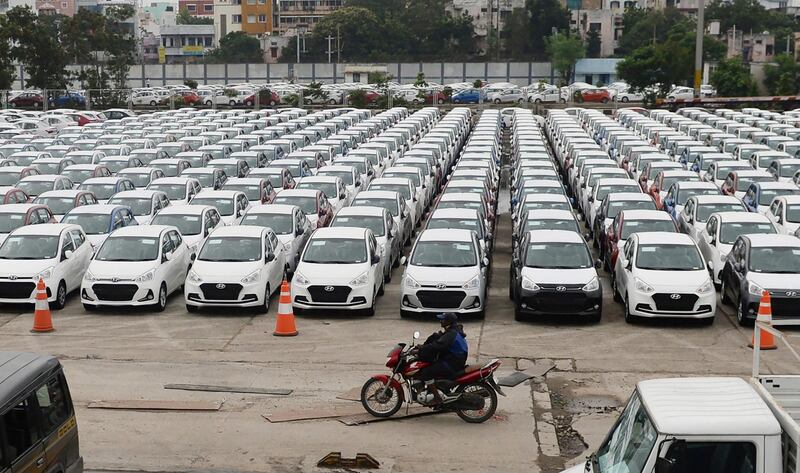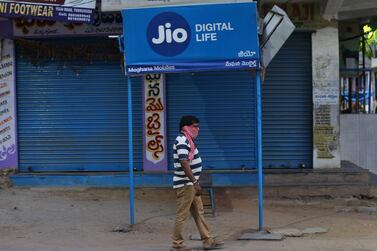India's automotive industry is facing an unprecedented slump as the country continues to enforce a nationwide lockdown to stem the spread of the deadly coronavirus. Major car manufacturers in Asia's third-largest economy reported zero car sales in April.
Some industry analysts say car makers could end up benefiting from the pandemic once India emerges from its lockdown, with more consumers expected to move around the country in their own vehicles rather than public transport, to avoid the risk of infection.
In the short term, however, there is no respite for car manufacturers in sight.
“We believe the next two months will also witness a subdued performance due to the ongoing Covid-19 issue and lockdown,” says Sneha Prashant, a car sector analyst at Centrum Broking, a financial services company in Mumbai.
“But we believe that social distancing will become the new normal post Covid-19 too, and there will be a shift from shared mobility to personal mobility.”
On March 25, the Indian government imposed one of the world’s strictest lockdowns in a bid to contain the spread of the virus. All non-essential businesses were closed and factories such as car manufacturing plants were shut as most of the country’s 1.3 billion people were confined to their homes.
India’s automotive industry has subsequently lost $300 million (Dh1.1 billion) a day, according to the Society of Indian Automobile Manufacturers.
The country’s largest car maker, Maruti Suzuki, reported an unprecedented “zero sales in the domestic market” in April. The company exported 632 vehicles, however, once port operations resumed.
Car companies such as Hyundai Motor India and Mahindra & Mahindra reported a similar scenario of zero sales in the domestic market and only limited exports in April.
Such a slump for India’s automotive sector, which is considered a bellwether for the wider economy, is concerning. The sector accounts for more than 7 per cent of India’s gross domestic product and employs about 29 million people, directly and indirectly, according to Siam data.
Car makers in India manufactured more than 26 million units, including passenger and commercial vehicles and motorcycles, during the financial year that ended on March 31, data shows.

The car industry, however, was struggling even before the coronavirus pandemic amid a broader slowdown in the Indian economy and a credit crisis in the non-banking financial sector of the country.
Last year, hundreds of thousands of jobs were lost in the sector, while some dealerships shut down amid temporary closures of plants as a result of subdued demand for cars.
“The [automotive] sector has endured tough times over the past six quarters,” says Raghunandhan Nl, an automotive and ancillaries analyst at Emkay Global Financial Services.
The impact of the lockdown is, however, is far worse than the challenges the industry faced last year.
The industry received some much-needed relief last Monday despite India's lockdown being extended for another two weeks. The government eased restrictions and car companies can now resume production, albeit with limited operations and smaller teams.
Dealerships in some parts of the country less affected by the spread of the coronavirus were also permitted to resume operations.
BMW Group India on Thursday restarted operations at its car assembly plant in Chennai with less than 50 per cent of its usual workforce. It said it has redesigned the plant’s layout to ensure social distancing and its employees have been provided with protective gear as a precaution.
But getting up and running again from a literal standstill is not easy.
Honda said it is finding it difficult to restart work due to travel restrictions that are still in place. It has, however, managed to re-open some of its dealerships.
“Barring a few states, dealerships have to take approval from local authorities to commence operations,” says Vivek Kumar, an automotive analyst at JM Financial in Mumbai. “Local authorities are still cautious in most of the regions.”
Restrictions on operations and social distancing norms at plants will also have a significant effect on production, he said. But many companies “have at least a month’s inventory, which will cushion the slow production ramp-up to a certain extent”, he said.
Maruti Suzuki says it plans to resume vehicle manufacturing at its plant in Manesar in north India from Tuesday. The company has already reopened some 600 dealerships across the country.
“Although the extent of the customer turnout and end demand [has] yet to be seen, a resumption of manufacturing and dealership operations is an initial positive sign for the industry,” Mr Kumar says.
Car companies in India are doing everything to drive sales - from maintaining strict hygiene rules to a thorough sterilisation of test-drive vehicles to letting customers buy vehicles online.
Honda launched its “Honda from Home” online booking platform to allow customers to buy a car without visiting a dealership.
“Customers can now conveniently book their Honda car from the comfort of their homes,” says Rajesh Goel, senior vice president and director of sales and marketing, Honda Cars India. “This platform is part of Honda’s digitisation efforts in car retail experience.”
Maruti Suzuki, which has 3,086 showrooms across the country, is “gearing up for the new normal ... and has put in place a comprehensive standard operating procedure for its dealerships across the country”, as it tries to reassure customers, the company said.
It says it only permits employees who report that they have been in good health for at least 14 consecutive days to resume work and has made thermal scanning and wearing of face masks mandatory for its staff.
“At the same time, not just our dealerships, but also our manufacturing facilities and service workshops are completely sanitised,” says Kenichi Ayukawa, managing director and chief executive of Maruti Suzuki India. “They are following all safety protocols, as prescribed by the government.”
It is also offering customers the option to buy and personalise cars online, as well as the "doorstep" delivery of vehicles.
But what kind of demand there is from customers remains to be seen.
Jinesh Gandhi, a research analyst at Motilal Oswal, a financial services company in Mumbai, predicts that demand in the car industry could start to bounce back from September, as India’s festive season begins. This is a popular time for Indians to make big-ticket purchases such as buying a new car. He also said people will probably be looking for an alternative to public transport.
“The initial response from countries like China is changing consumer preference toward private transportation,” he says. “We believe this could be a transitory benefit even in India.”
There are only 30 cars for every 1,000 people in India, according to the Federation of Automobile Dealers Association, suggesting there is huge scope for an increase in car ownership in the country.
But in the current scenario, there are several potential roadblocks and there is little visibility about the future of the industry – at least in the short to medium term.
“The pace of recovery will depend on several factors such as the time taken to return to normality, stimulus from the government and the extent of job and income losses,” Mr Ghandi says.
Figures from the Centre for Monitoring Indian Economy, a think tank, show that unemployment in the country hit a record high of 27.11 per cent in the week ending May 3. Some employees also took salary cuts as many companies have struggled to generate enough revenue during the lockdown.
Uncertainty around jobs could prompt some to shy away from splashing out on new cars.
“We think demand sentiment is low due to uncertainty regarding jobs and the economic outlook,” says Ms Prashant.
Nitin Shahi, the executive director of Findoc, an online trading company in India, says the “effect of the pandemic can be seen in the performance of stocks”.
Tata Motors’ shares have slumped more than 50 per cent since the beginning of this year while Maruti Suzuki is down by about 36 per cent.
While there are hopes of a turnaround later in the year, some analysts believe that share performance and the industry might not recover as soon as some investors hope.
“The future looks lean for the already troubled [car] sector as the economy has tumbled [due to the coronavirus pandemic],” says Mr Shahi. “With ... pay cuts, a reduction in discretionary spending is expected over the next few quarters.”








